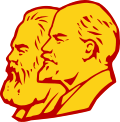Unified state apparatus
| Part of a series on |
| Marxism–Leninism |
|---|
 |
The unified state apparatus is the state structure of communist states, meaning the state is organized as a single branch of government where all powers emanate from the organs of state power.
Concept
[edit]The concept of a unified status apparatus has been given different names in different communist states. In former East Germany, it was referred to as the "unitary socialist state power", while the present-day communist state of Vietnam simply refers to it as the state apparatus of a unified character. All state organs of communist states are organs of the unified state apparatus. In East Germany, regarding the Supreme Court, the official understanding was that "the courts of [East Germany] are an inseparable component of the unitary socialist state power."[1]
The supreme state organ of power heads the unified state apparatus. This is why, for example, the 1936 Constitution of the Soviet Union designated the Supreme Soviet as the supreme state organ of power: it held the supreme powers of the state.[2]
All other state organs are subordinate to the supreme state organ of power, and it acts as the chief lawmaker and the pinnacle of the constitutional system.[3] This also means, as was the case in the Soviet Union, that the supreme state organ of power controlled the lower-level soviets. From a Marxist−Leninist perspective, the supreme state organ of power personifies the people's will. According to Andrey Vyshinsky, a leading Soviet legal theorist who served as the Procurator General of the Soviet Union, power is "personified in the [supreme state organ of power], the will of the people—of the masses of millions of workers, peasants and intellectuals—finds expression."[4]
In communist states, all state organs are elected by the supreme state organ of power, which is either directly elected through controlled elections, as they were in the Soviet Union, or indirectly elected, as in the People's Republic of China.[5]
See also
[edit]References
[edit]Books
[edit]- Sperlich, Peter W. (2007). The East German Social Courts Law and Popular Justice in a Marxist−Leninist Society. Praeger. ISBN 978-0275975647.
- Vanneman, Peter (1977). The Supreme Soviet: Politics and the Legislative Process in the Soviet Political System. Duke University Press. ISBN 0-8223-0357-4.
Footnotes
[edit]- ^ Sperlich 2007, p. 101.
- ^ Vanneman 1977, p. 3.
- ^ Vanneman 1977, pp. 37−38.
- ^ Vanneman 1977, p. 42.
- ^ Vanneman 1977, pp. 43−44 & 111.
